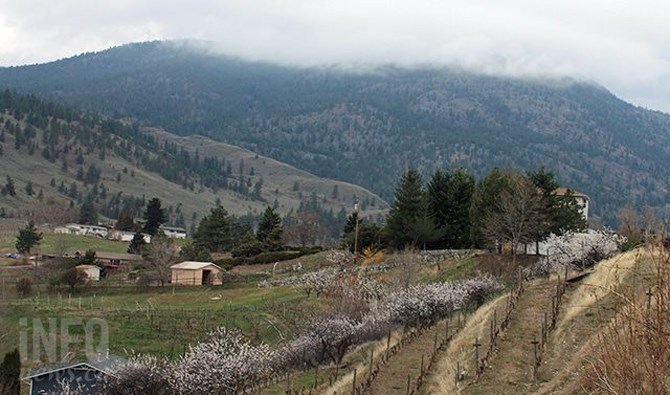
(JOHN MCDONALD / iNFOnews.ca)
March 26, 2015 - 9:33 AM
OKANAGAN - With less than a week left in March spring is well under way in the valleys, but that doesn’t mean winter conditions are not present on mountain highways or in the backcountry.
Avalanche Canada is warning of a moderate to high risk of avalanches in many of the alpine and treeline elevations throughout the Interior. This increased risk comes on the heels of a mix of rain in snow in the region and more in the forecast.
Throughout the Okanagan temperatures will hit between 15 Celsius and 17 C on Friday, March 27, and will remain just above the seasonal normal of 11 C over the weekend. Rain should end this morning, March 26, but could return Friday evening and again Sunday.
Rain has hit Interior highways in the last 24 hours, and in some places resulted in several centimetres of snow at the mountain route, such as the Pennask Summitt. More rain and as much as 5 centimetres of snow is expected on Highway 1 from Eagle Pass to Rogers Pass this morning
For those looking to head into the backcountry be aware the North Columbia and Glacier National Park ranges currently have a high risk of avalanche in the alpine while most other elevations in the area ranges are moderate to considerable. A special public avalanche warning has been issued for the Sea to Sky and the northern ranges, including the North Columbia and Cariboos.
“Avalanches are being triggered both in the newer, surface snow and in deeper layers that formed earlier in the winter,” Karl Klassen of Avalanche Canada said in a media release. “This challenging scenario is resulting in numerous close calls and led to two fatalities this past weekend.”
The advice is to stay on simple, low-angle terrain and avoid large, steep slopes. Watch for overhead hazard and avoid travelling where other users are on slopes above. If you do not have the training or experience to assess avalanche terrain and local conditions, Avalanche Canada recommends only going where avalanche risk is professionally managed.
All backcountry users must be equipped with essential avalanche safety equipment, according to the release. Everyone in the party needs an avalanche transceiver, a probe and a shovel every day. It’s equally important that everyone has avalanche training and has practiced using this equipment. If an avalanche occurs, the rescue is up to you. There is no time to go for help.
To contact a reporter for this story, email Jennifer Stahn at jstahn@infonews.ca or call 250-819-3723. To contact an editor, email mjones@infonews.ca or call 250-718-2724.
News from © iNFOnews, 2015